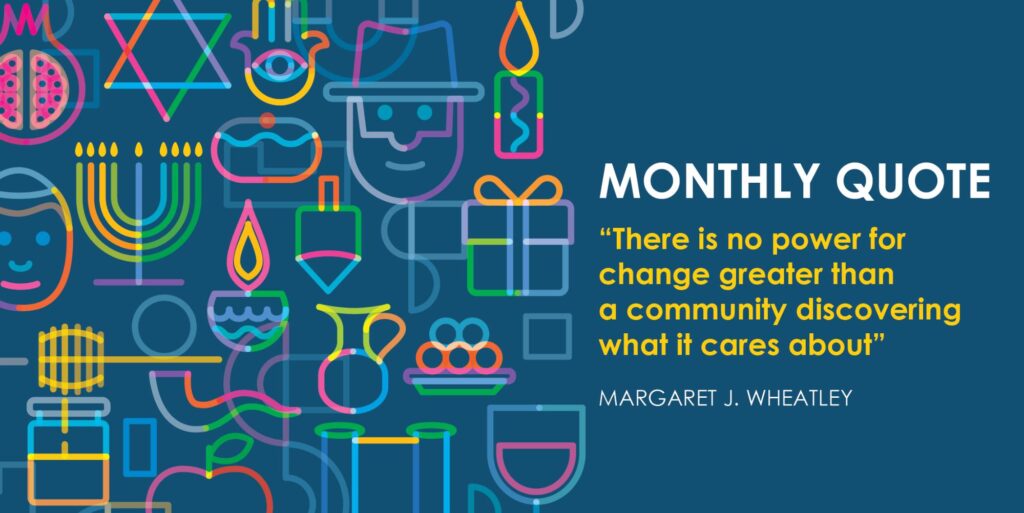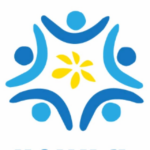Dear Hakhel Communities,
This week, we will read in the Torah portion Vayeitzei about Jacob’s Ladder. As Jacob is running away from Esau, he stops to rest and has a powerful dream about a ladder, with angels ascending and descending. What did it mean? The ladder served as the infrastructure of a connection between Heaven and Earth. With a not insignificant exertion of effort, for instance through prayer – or perhaps even through community-building – it becomes possible both to ascend and reach Heaven, and also to descend to bring its teachings back to Earth.
In what ways do you feel that you, as a community leader, are acting as a kind of bridge between Earth and some aspect of Heaven – either the teachings of the Torah, Judaism, or some essence of the Divine?
Midrash Rabbah teaches that Jacob’s dream is actually a premonition of receiving Torah at Mount Sinai, as the gematria (numeric value) of the letters of the Hebrew word sulam (ladder) is the same as that of the word Sinai. In this sense, Jacob is a visionary whose dream predicts the founding of this wandering Jewish people as a nation at Sinai. What dreams or visions do you have for your own community’s future?


Community Spotlight: STAND Intentional Community Saratoga
STAND IC Saratoga is a place where families and individuals of varying means, abilities and ages can live, thrive and contribute. Toren Zobel, son of one of the co-founders, is the first resident on this recently purchased property in Saratoga Springs, NY. S.T.A.N.D. is an acronym: Socially, Therapeutic, Authentic, Neighborhood, Dwellings; offering home ownership in a community where people lend a hand, or share a meal, it alleviates burdens and social isolation. Learn more about this community and approach from this interview by Hakhel Network Manager Deborah Fishman Shelby with its community builders, Bracha Moeller-Bloom and Martina Zobel.
Tell us in a few words about your community and what is special about it.
Bracha: Our community is an actual dwelling place, a neighborhood we will live in. We are dedicated to making it supportive, open, adventurous, loving and joyful, because that’s the way we want to live together.
Martina: One of the pieces that will be unique is the way our community is permeable. Intentional communities can become closed units with little to do with the surrounding neighborhoods. City residents are invited to use our trails or join us for jam-making in the common house kitchen. We aim to strike a balance that allows people to see Yiddishkeit from a warm lens.
What put you on this path to be a community builder and leader?
Bracha: Over the years, I felt I haven’t gotten to spend enough time with the people I know or want to know. A lot is related to proximity, convenience and to the walls we put up. There has always been this longing for community; now I have a co-creator and we’re building our vision.
Martina: When my grown son Toren was struck with a devastating illness we were both working at the URJ Kutz Camp. The community rallied around us, when he was finally discharged, it was the closeness and practical help of the camp community that allowed us to function safely. At the end of summer we returned to our lovely warm Jewish community in Saratoga, but the proximity was missing. That sharp contrast was pivotal, becoming the germinating seed: now we are building that communal experience with and for others.
How does Judaism inform or play a part in your community-building?
Martina: The Judaism that lives in only books is not as valuable to me as a Judaism that lives embodied in the world. This community is informed by the desire for the project itself to be as Shalem (whole) as possible.
Bracha: When you notice the first ripe tomato of the harvest and say the blessing, you teach the kids walking with you that the purpose of the bracha is to heighten your awareness, increasing the delight. That’s what the best of Jewish living is about, the intentionality, how we deal with each other and the earth and ourselves.
What is one takeaway or lesson from your work that you would like to share?
Bracha: Martina and I have been impressed from the beginning that nothing has been wasted since we began this journey, which started with inquiry and just an idea. I am reminded that when we open ourselves up to listen, we learn things we didn’t expect; people have been so generous with time and wisdom.
Martina: I’ve learned that the sum of the parts is way, way greater than the individual pieces. We have experienced so much incredible synergy by not being rigid. If you are fluid and curious and still hold your vision clearly, the vision has the possibility to be born, but not necessarily in the way you anticipated. Or as we find in Mussar: Gam zu l’tova (also this is for the good).
If you would like to be our next community in the spotlight, please email Deborah at deborah.fishman@hazon.org.

Hakhel held successful seminars and gatherings in Panama, Costa Rica, Mexico, New York, Melbourne, and Tbilisi, all within a month!
LAZOS held three Latin American gatherings – in Mexico, Costa Rica, and Panama! These gatherings mobilized young adults from these communities by providing professional support, which was especially meaningful after the social and labor stagnation they have been experiencing. Other goals were to generate and expand the professional/business and social networks between participants in order to increase their sense of belonging to a large, globalized, open-minded network of communities.

In Caulfield Park in Melbourne, Australia on October 31, 2021, 15 members of Hakhel communities came together for a face-to-face meeting for the first time after many months of lockdown. A lively discussion about the meaning of Shmita and how we might apply its values in our communities today followed a delicious picnic in the glorious spring sunshine. “Pita and Shmita” was a huge success and the first big step towards reconnecting the local Hakhel network.

A group of Hakhel community leaders from around the Northeast came together from October 29-31 for the NYC Hakhel retreat. It felt amazing to be in dialogue with fellow community-builders again and to have the opportunity over Shabbat to get to know each other on a deeper level. Among other highlights, we went on a walking tour of Jewish Harlem; visited the Jewish Museum; experienced Iyun learning together; and spent Sunday exploring the essential principles of community-building and our – and our communities’ – connection to Israel.

Twenty-five leaders from 9 of Hakhel’s Russian-speaking communities gathered in Tbilisi, Georgia last week. This seminar is the highlight of an ongoing process training those leaders to be the better versions of themselves, and their communities. Together, they learned about professional community building, Jewish texts, business planning, fundraising and more.

In next month’s newsletter, we will be excited to share ways Hakhel communities celebrated Chanukah! If you would like a photo and blurb from your community to be included, please email it to Deborah at deborah.fishman@hazon.org.

Visit Israel with Hakhel in February!

Yes, COVID is still here, but the world is learning to live alongside it, and among other new developments, Israel opened up for visitors as of November 1st. We therefore opened registration for the Hakhel February Israel Trip, taking place February 7-13, 2022!
We have a very limited number of spots this year. If you are interested in more information, please contact Gabe Axler: Gabe.axler@hazon.org.
Hakhel Delegation to e-Summit of European Jewry

Based on the success of the 1st European e-Summit of Jewish Leaders in 2020, we bring you the 2nd e-Summit of European Jewry!
November 19th-22nd, 2021
After the last gathering with more than 750 participants in 2020, this year we are committed to raising it a gear by offering something larger and deeper.
Please sign below to join the first e-Summit of European Jewish leaders, as part of Hakhel’s delegation (Open to all countries! There is content here you really don’t want to miss!).
Thanks to our collaboration with our funders, participation for Hakhel members is FREE OF CHARGE.
You will receive a link to the online platform closer to the event. Click here for more info and registration.
ICSA Conference: Now Accepting Proposals

Do you have some interesting thoughts on Intentional Communities which the academic world should know about?
You might want to apply to the triennial conference of the Intentional Communities Studies Association!
The next conference will be held on July 14-16, 2022 in Denmark AND online, and the deadline to submit proposals is December 1st, 2021. If you would like to brainstorm some ideas please reach out to Aharon Ariel to discuss it.
Some Hakhel members are already planning to be there, what about you?
Click here for more info and to apply.
PS: At this point Hakhel cannot commit to cover travel and/or accommodation expenses related to this conference. However, if your proposal gets accepted this might be an option. Please be in touch after you hear back from the conference organizers.

